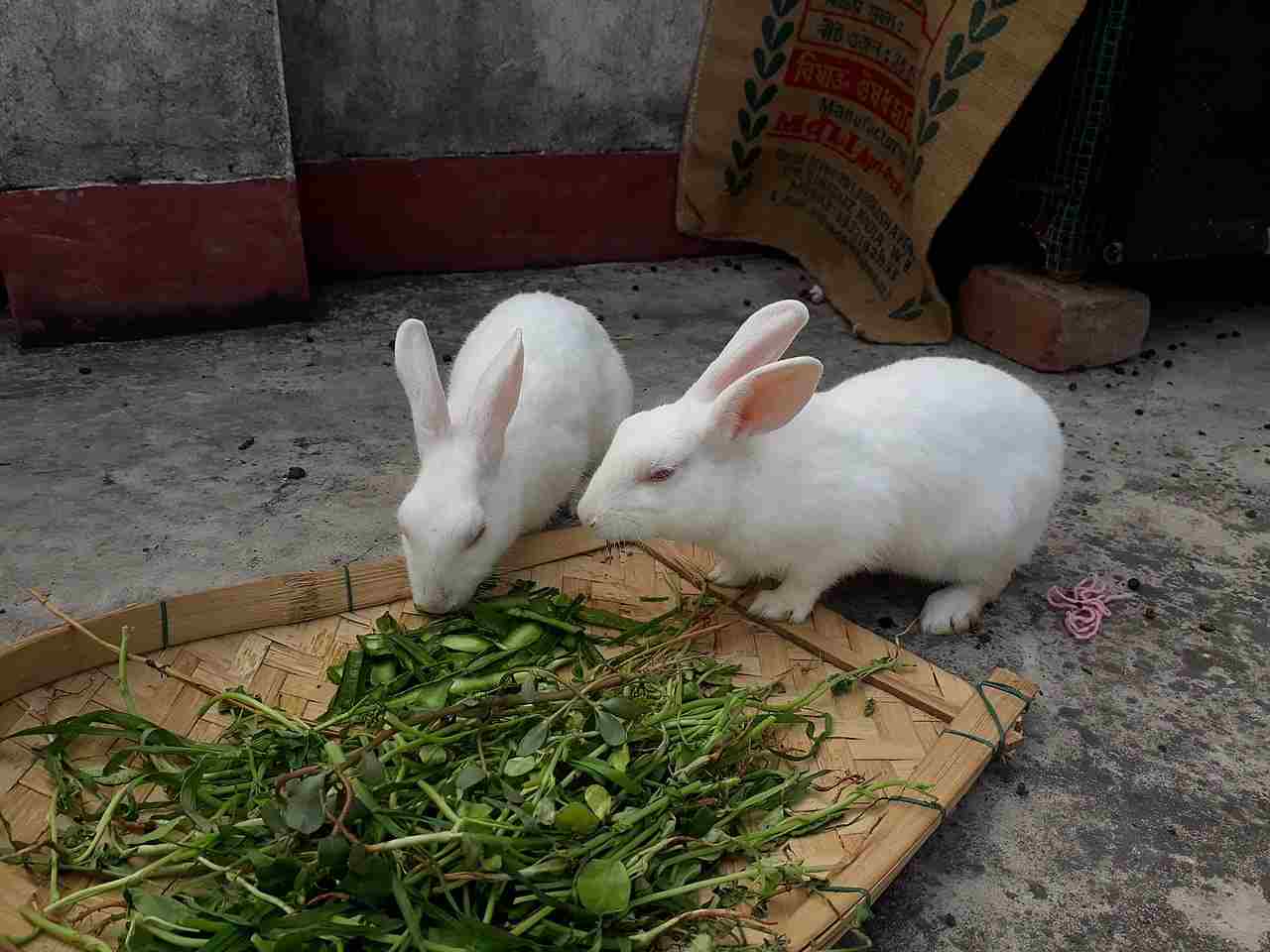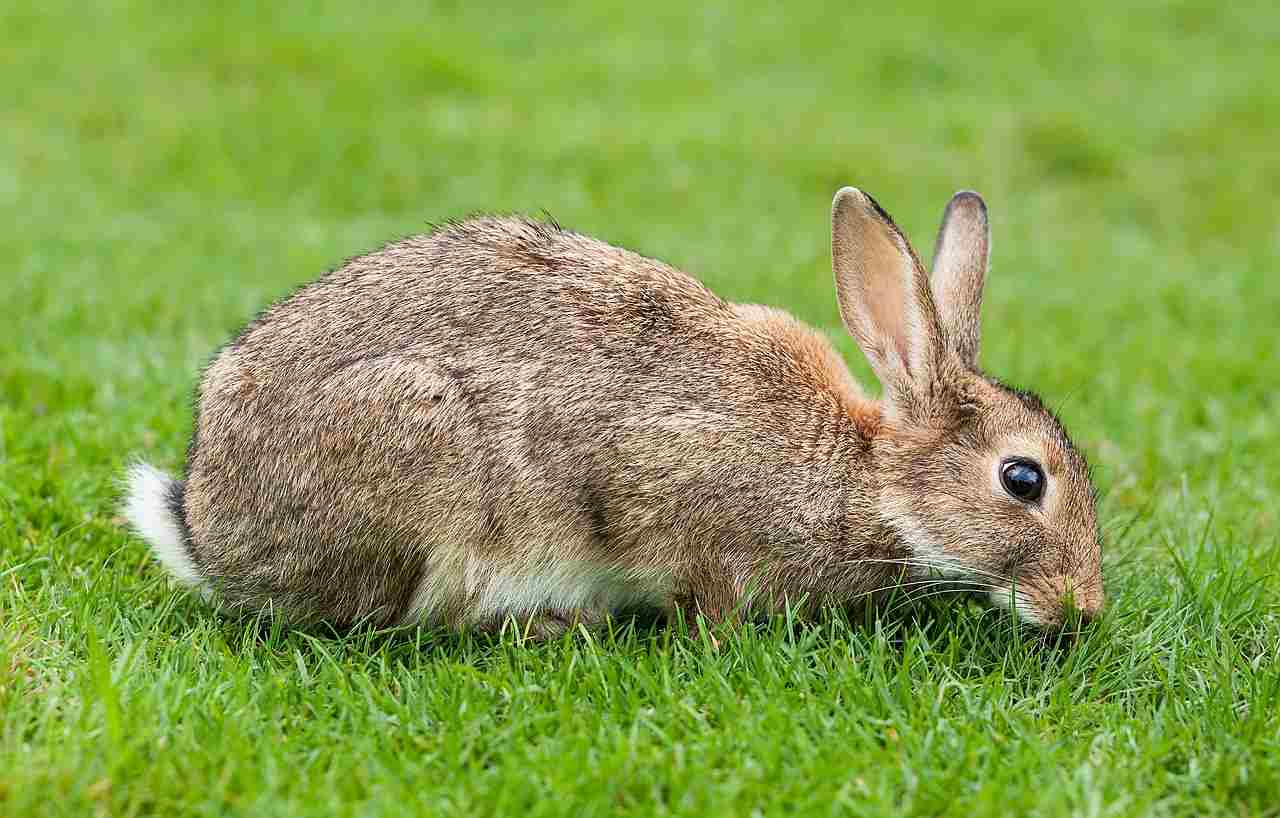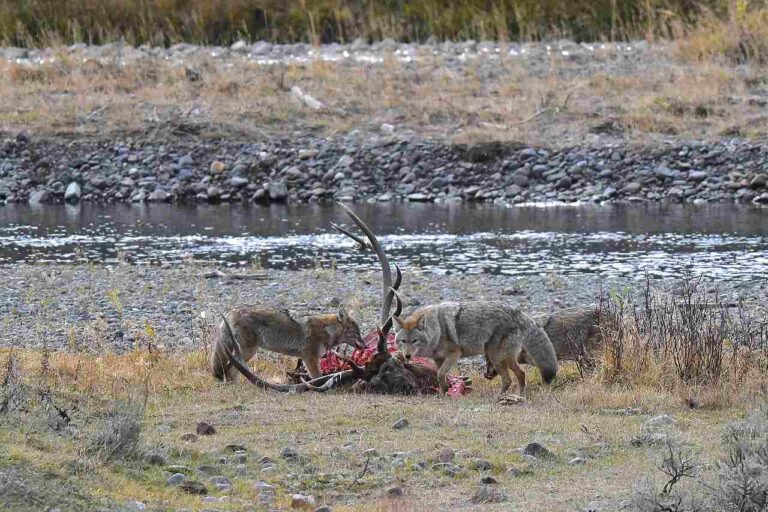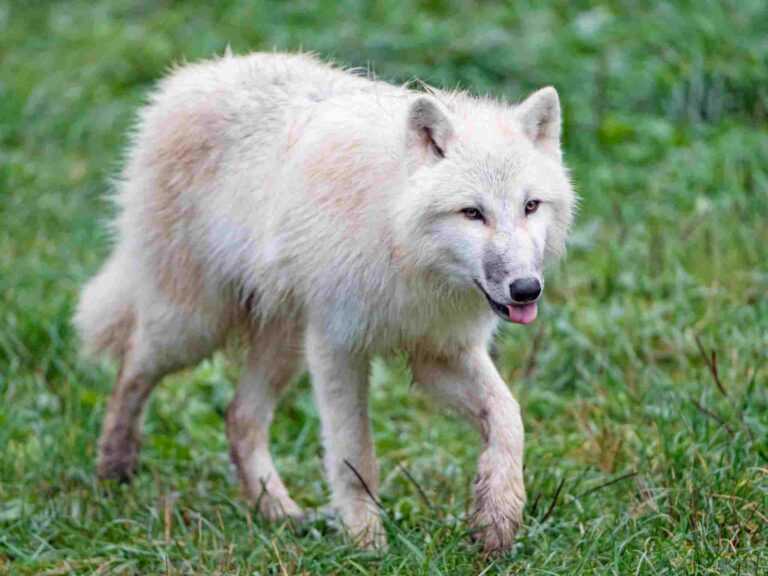Is a Rabbit a Herbivore, Carnivore or Omnivore? Feeding Habits of Rabbits Revealed
A rabbit is an obligate herbivore, which generally feeds only on plant matter in the from of fruits, nuts, seeds, foliage, roots and fleshy stems among others.
Reasons Why a Rabbit is Considered a Herbivore
1. Plant-dominated Diet
Rabbits are considered herbivores primarily because of their plant-dominated diet. This means that the majority of their diet consists of plants. Rabbits consume a variety of plant materials, including grasses, leaves, stems, and even bark. They have a specialized digestive system that allows them to efficiently break down and extract nutrients from these plant materials.
One reason why rabbits are herbivores is because their teeth are adapted for chewing plant matter. Rabbits have long incisors that continuously grow throughout their lives. These sharp incisors are perfect for cutting through tough plant fibers. Additionally, rabbits have a set of molars and premolars that are designed for grinding and crushing plant material.
Another reason why rabbits are herbivores is because they lack the necessary enzymes to digest meat. Unlike carnivores, rabbits do not produce enough stomach acid or enzymes like pepsin to break down proteins found in meat. Their digestive system is specifically adapted to process plant material, which is easier to break down and extract nutrients from.
Rabbits also have a unique digestive process that allows them to extract as many nutrients as possible from their plant-based diet. After consuming plant material, rabbits produce soft, partially digested feces called cecotropes. These cecotropes are rich in nutrients and are re-ingested by the rabbit to extract even more nutrients from the plant material.

2. Rabbits Do Not Rely On Non-Plant Food Sources
Rabbits are considered herbivores because they do not rely on non-plant food sources. This means that their diet consists solely of plants and plant materials. Rabbits consume a variety of plant-based foods, including grasses, leaves, stems, and even bark. They have evolved to efficiently extract nutrients from these plant sources.
One reason why rabbits do not rely on non-plant food sources is because their digestive system is specifically adapted to process plant material. Unlike carnivores, rabbits lack the necessary enzymes to digest meat. They do not produce enough stomach acid or enzymes like pepsin to break down proteins found in meat. Instead, their digestive system is designed to break down and extract nutrients from plant material, which is easier to digest.
Another reason why rabbits do not rely on non-plant food sources is because their teeth are adapted for chewing plant matter. Rabbits have long incisors that continuously grow throughout their lives. These sharp incisors are perfect for cutting through tough plant fibers. Additionally, rabbits have a set of molars and premolars that are designed for grinding and crushing plant material. Their teeth are not suited for tearing or chewing meat.
Rabbits also have a natural instinct to seek out and consume plant-based foods. They are highly selective eaters and have a keen sense of smell to detect and locate edible plants. Their digestive system is optimized to extract as many nutrients as possible from their plant-based diet. After consuming plant material, rabbits produce soft, partially digested feces called cecotropes. These cecotropes are rich in nutrients and are re-ingested by the rabbit to extract even more nutrients from the plant material.
3. They are Classified as Primary Consumers
One of the reasons why rabbits are considered herbivores is because they are classified as primary consumers. In ecological terms, primary consumers are organisms that primarily feed on plants. They play a crucial role in the food chain by consuming plant material and converting it into energy.
Rabbits are well-known for their plant-dominated diet, which consists of various plant-based foods such as grasses, leaves, stems, and even bark. These foods provide the necessary nutrients and energy for rabbits to survive and thrive. By consuming plants, rabbits contribute to the transfer of energy from the sun, which is captured by plants through photosynthesis, to higher levels of the food chain.
As primary consumers, rabbits occupy an important position in the ecosystem. They serve as a link between plants and other organisms in the food web. By consuming plant material, rabbits help control plant populations and prevent overgrowth. This, in turn, affects the abundance and distribution of other organisms in the ecosystem.
Furthermore, rabbits have specific physiological adaptations that support their role as primary consumers. Their digestive system is specialized for processing plant material. Unlike carnivores, rabbits lack the necessary enzymes to digest meat. Instead, their digestive system is designed to break down and extract nutrients from plant material, which is easier to digest. This includes a large cecum, a specialized organ that aids in the fermentation and extraction of nutrients from plant fibers.
In addition to their digestive system, rabbits also have specialized dentition that is adapted for chewing plant matter. Their long incisors continuously grow throughout their lives, allowing them to efficiently cut through tough plant fibers. The molars and premolars in their jaw are designed for grinding and crushing plant material, further aiding in the breakdown of plant fibers for digestion.
4. Possession of Herbivorous Physiological Adaptation
Rabbits possess several herbivorous physiological adaptations that further support their classification as herbivores. One of these adaptations is their dentition, specifically their long incisors that continuously grow throughout their lives. These sharp incisors allow rabbits to efficiently cut through tough plant fibers, making it easier for them to consume plant material. Additionally, rabbits have molars and premolars in their jaw that are designed for grinding and crushing plant matter, aiding in the breakdown of plant fibers for digestion.
Another important herbivorous adaptation in rabbits is their digestive system. Unlike carnivores, rabbits lack the necessary enzymes to digest meat. Instead, their digestive system is specialized for processing plant material. One key component of their digestive system is the large cecum, a specialized organ that aids in the fermentation and extraction of nutrients from plant fibers. The cecum allows rabbits to extract as many nutrients as possible from the plant material they consume.
Furthermore, rabbits have specific nutritional needs that are met through their herbivorous diet. Plant-based foods provide rabbits with essential nutrients such as fiber, vitamins, and minerals. These nutrients are crucial for their overall health and well-being. Rabbits have evolved to efficiently extract and absorb these nutrients from plant material, ensuring that they receive the necessary sustenance from their herbivorous diet.
Are Rabbits Omnivores or Herbivores?
Rabbits are generally considered herbivores, meaning they primarily consume plant matter. Their diet consists mainly of grasses, leaves, and other plant material. This plant-dominated diet is a key characteristic that supports their classification as herbivores.
In some cases, especially in the wild, rabbits may exhibit omnivorous tendencies, such as opportunistic insect consumption. However, these instances are very rare and do not alter their general classification as herbivores. While rabbits may occasionally consume insects or other small animals, it is usually out of curiosity, lack of preferred food sources, or other factors rather than a true dietary need.
It is important to note that domestic rabbits may also consume animal-based food, especially processed ones. However, even in these cases, they are still generally herbivorous and obtain most of their nutrients from plant matter. The inclusion of animal-based food in their diet is often a result of human intervention or the availability of such food sources in their environment.
Rabbits have evolved to efficiently extract and absorb nutrients from plant material. Their digestive system is specialized for processing plant matter, and they lack the necessary enzymes to digest meat. One of the key adaptations in their digestive system is the presence of a large cecum, which aids in the fermentation and extraction of nutrients from plant fibers. This allows rabbits to extract as many nutrients as possible from the plant material they consume.
Their dentition also reflects their herbivorous nature. Rabbits have long incisors that continuously grow throughout their lives. These sharp incisors enable them to efficiently cut through tough plant fibers, making it easier for them to consume plant material. Additionally, they have molars and premolars in their jaw that are designed for grinding and crushing plant matter, aiding in the breakdown of plant fibers for digestion.
The herbivorous diet of rabbits provides them with essential nutrients such as fiber, vitamins, and minerals. These nutrients are crucial for their overall health and well-being. Rabbits have specific nutritional needs that are met through their consumption of plant-based foods. They have evolved to efficiently extract and absorb these nutrients from plant material, ensuring that they receive the necessary sustenance from their herbivorous diet.
Are Bunnies Carnivores?
While rabbits are generally considered herbivores, there may be instances where they exhibit omnivorous tendencies. However, it is important to note that these instances are rare and do not alter their general classification as herbivores. Rabbits primarily consume plant matter such as grasses, leaves, and other plant material, which supports their classification as herbivores.
In some cases, rabbits may consume bugs and other smaller animals, but this behavior is usually out of curiosity, lack of preferred food sources, or other factors. It is not a true dietary need for them. Their main source of nutrition comes from plant-based foods. Rabbits have evolved to efficiently extract and absorb nutrients from plant material, and their digestive system is specialized for processing plant matter.
Rabbits are better described as herbivorous primary consumers. They rely on plant-based foods to meet their nutritional needs. Their diet provides them with essential nutrients such as fiber, vitamins, and minerals, which are crucial for their overall health and well-being. Rabbits have specific nutritional requirements that are met through their consumption of plant material.
In terms of their feeding habits, rabbits are known to have a plant-dominated diet. They have adapted to efficiently extract as many nutrients as possible from the plant material they consume. Their dentition reflects their herbivorous nature, with long incisors that continuously grow throughout their lives. These sharp incisors enable them to cut through tough plant fibers, making it easier for them to consume plant material. Additionally, they have molars and premolars in their jaw that are designed for grinding and crushing plant matter, aiding in the breakdown of plant fibers for digestion.
Rabbits are classified as primary consumers in the food chain. They play an important role in the ecosystem by consuming plant material and contributing to nutrient cycling. Their herbivorous diet supports the growth and reproduction of plants, as they disperse seeds through their feces.
FAQs
1. Is a Rabbit an Omnivore or a Carnivore?
A rabbit is neither an omnivore nor a carnivore. Instead, it is classified as a herbivore. This means that rabbits primarily consume plant-based foods such as grass, hay, and leafy greens. They have evolved to have specialized digestive systems that are specifically designed to process and extract nutrients from plant matter.
Rabbits have a unique dental structure that includes long incisors and a set of continuously growing teeth. These teeth are perfectly adapted for grinding and chewing fibrous plant material. Additionally, rabbits have a large cecum, which is a specialized part of their digestive system that helps break down cellulose and extract nutrients from plant fibers.
Their preference for plant-based foods over animal-based foods is driven by both evolutionary behavioral and physiological adaptations. Rabbits have developed a keen sense of smell and taste, allowing them to identify and select the most nutritious plant options available to them. This selective feeding behavior ensures that they obtain the necessary nutrients for their growth and overall well-being.
2. Why is a Rabbit a Herbivore?
Rabbits are classified as herbivores due to their strong preference for plant-based food over animal-based food. This dietary preference is driven by a combination of evolutionary behavioral and physiological adaptations.
From an evolutionary standpoint, rabbits have developed a keen sense of smell and taste that allows them to identify and select the most nutritious plant options available to them. This selective feeding behavior ensures that they obtain the necessary nutrients for their growth and overall well-being. Their specialized digestive system, including their unique dental structure and large cecum, is specifically designed to process and extract nutrients from plant matter.
Rabbits have long incisors and continuously growing teeth that are perfectly adapted for grinding and chewing fibrous plant material. This enables them to efficiently break down the tough cellulose found in plants. Additionally, their large cecum, a specialized part of their digestive system, helps break down cellulose and extract nutrients from plant fibers.
These evolutionary adaptations have made rabbits highly efficient at digesting and extracting nutrients from plant-based foods. While they may technically be able to consume small amounts of meat depending on their environment and growth conditions, rabbits do not have the suitable digestive capacity to process meat effectively. Therefore, their diet primarily consists of grass, hay, and leafy greens.
3. Can Rabbits Eat Meat?
Rabbits are primarily herbivores and their diet consists mainly of plant-based foods. However, in certain circumstances, rabbits may consume small amounts of meat.
In the wild, rabbits may occasionally come across insects or small animals, such as mice or birds, and may consume them as a source of protein. This behavior is more commonly observed in wild rabbits that have limited access to their usual plant-based food sources.
However, it’s important to note that rabbits do not have the suitable digestive capacity to process meat effectively. Their digestive system is specifically adapted for breaking down and extracting nutrients from plant matter. The structure of their teeth and their large cecum are designed to efficiently process fibrous plant material.
Feeding rabbits a diet that includes meat is not recommended as it can lead to digestive issues and other health problems. It’s best to provide rabbits with a balanced diet that consists of fresh hay, grass, leafy greens, and commercial rabbit pellets. These foods provide the necessary nutrients for their growth and overall well-being.
4. Is a Rabbit an Example of an Omnivore?
No, a rabbit is not an example of an omnivore. Omnivores are animals that have the ability to consume both plant-based foods and meat. Examples of omnivores include squirrels, raccoons, and coyotes. However, rabbits are rather obligate herbivores, meaning their diet consists solely of plant-based foods.
Rabbits have a specialized digestive system that is specifically adapted for breaking down and extracting nutrients from plant matter. Their teeth are designed for grinding and chewing fibrous plant material, and they have a large cecum, which helps them efficiently process and extract nutrients from the cellulose found in plants.
Unlike omnivores, rabbits do not have the necessary digestive capacity to effectively process meat. Feeding rabbits a diet that includes meat can lead to digestive issues and other health problems. It is best to provide rabbits with a balanced diet that consists of fresh hay, grass, leafy greens, and commercial rabbit pellets. These foods provide the necessary nutrients for their growth and overall well-being.
5. What Does a Rabbit Eat?
Rabbits have a diverse diet consisting mainly of plant materials. They consume a variety of foliage, such as grass, leaves, and herbs. Fruits, such as berries and apples, are also a part of their diet. Rabbits also eat bulbs, roots, and tubers, which provide them with essential nutrients. Additionally, they may consume fleshy stems of plants.
The digestive system of rabbits is specifically adapted to process plant-based foods. They have sharp incisors that help them efficiently grind and chew fibrous plant material. Rabbits also have a large cecum, which is a specialized organ that aids in the digestion of cellulose found in plants.
It is important to provide rabbits with a balanced diet to ensure their overall health and well-being. Fresh hay is a crucial component of their diet as it provides essential fiber. Leafy greens, such as lettuce and spinach, should also be included in their meals. Commercial rabbit pellets can be given in moderation to supplement their diet.
It is essential to avoid feeding rabbits foods that are harmful to them. Some examples include chocolate, onions, and avocados, which can be toxic to rabbits. It is always best to consult with a veterinarian or a rabbit nutritionist to ensure that you are providing the right foods for your rabbit.
6. Is a Rabbit an Example of a Herbivore?
Yes, a rabbit is indeed an example of a herbivore. Herbivores are animals that primarily consume plant-based foods. Rabbits have a diet that consists mainly of plant materials, such as grass, leaves, herbs, and fruits. They also eat bulbs, roots, and tubers, which provide them with essential nutrients.
The digestive system of rabbits is specifically adapted to process plant-based foods. They have sharp incisors that help them efficiently grind and chew fibrous plant material. Additionally, rabbits have a large cecum, which is a specialized organ that aids in the digestion of cellulose found in plants. This allows them to extract the maximum amount of nutrients from their plant-based diet.
It is important to note that rabbits are strict herbivores and do not consume meat. Their teeth, digestive system, and nutritional needs are all designed for a plant-based diet. Feeding rabbits meat can lead to digestive issues and other health problems. Therefore, it is crucial to provide rabbits with a balanced diet consisting of fresh hay, leafy greens, and other appropriate plant-based foods.
7. Are Hares Omnivores?
Some hares are indeed omnivorous, and consume both plant and animal biomass as s result of opportunistic (and territorial) behavioral adaptations.
Hares, like rabbits, are primarily herbivores, but not all hares have the same dietary habits. While Arctic hares are known to consume only plant matter, snowshoe hares have a more varied diet that includes meat in addition to plants. Snowshoe hares have been observed consuming meat from smaller vertebrates and invertebrates. They may even exhibit cannibalistic behavior by preying on young or vulnerable hares.
The inclusion of meat in the diet of snowshoe hares is believed to be a result of their habitat and the availability of food sources. In certain environments, plant-based foods may be scarce, leading snowshoe hares to adapt and consume meat for survival. However, it is important to note that this behavior is not common among all hares.
It is worth mentioning that the consumption of meat by hares is not the norm and is not a defining characteristic of their diet. The majority of hares, including Arctic hares, primarily rely on plant matter for their nutritional needs. Their digestive systems and teeth are adapted for processing and extracting nutrients from plant-based foods.
8. Why Does My Rabbit Eat Meat?
Your rabbit may consume meat because domesticated rabbits exhibit slightly variant feeding behavior from wild rabbits, due to their access to unnatural food sources.
As a result, they may consume meat or other animal foods if available. However, it is important to note that rabbits cannot effectively digest meat in large quantities.
Rabbits are primarily herbivores, with their digestive systems and teeth adapted for processing and extracting nutrients from plant-based foods. Their natural diet consists of grass, hay, vegetables, and occasional fruits. These foods provide the necessary fiber, vitamins, and minerals for their overall health and well-being.
In some cases, rabbits may show an interest in meat or other animal-based foods out of curiosity or as a result of their natural foraging instincts. However, it is crucial to understand that meat should not be a significant part of their diet. Rabbits lack the necessary enzymes and digestive capabilities to break down and absorb the nutrients from meat effectively.
If you notice your rabbit eating meat, it is essential to assess their overall diet and ensure they are receiving a balanced and appropriate nutrition. Consult with a veterinarian to determine if any dietary adjustments are necessary. Providing a varied and enriching diet that includes a mix of hay, fresh vegetables, and limited amounts of fruits will help meet your rabbit’s nutritional needs and prevent them from seeking out inappropriate food sources.
9. Why is My Rabbit Eating My Other Rabbit’s Fur?
Rabbits may engage in fur-eating behavior for various reasons, including hormonally induced behavioral anomalies, dominance expression, or a lack of sufficient fiber in their diet.
Fur-eating, also known as wool-chewing or barbering, can occur when rabbits excessively groom themselves or other rabbits, leading to the consumption of fur. This behavior can be concerning for rabbit owners, but understanding the underlying causes can help address the issue.
Hormonal imbalances, such as an increase in testosterone levels in male rabbits, can contribute to fur-eating behavior. This behavior may be a way for rabbits to establish dominance or mark their territory. Neutering or spaying rabbits can help regulate hormone levels and reduce the likelihood of fur-eating.
Another factor that can contribute to fur-eating is a lack of sufficient fiber in the rabbit’s diet. Fiber is essential for maintaining a healthy digestive system and preventing boredom. When rabbits do not have enough fiber in their diet, they may resort to fur-eating as a form of entertainment or to compensate for the lack of chewing opportunities. Providing unlimited access to hay, which is high in fiber, can help alleviate this behavior.
If you notice your rabbit engaging in fur-eating, it is important to consult with a veterinarian to rule out any underlying health issues. Additionally, ensuring a balanced diet with plenty of fiber-rich foods, providing mental and physical stimulation through toys and playtime, and addressing any potential hormonal imbalances can help discourage fur-eating behavior in rabbits.
10. What Happens if a Rabbit Eats Meat?
If a rabbit eats meat, nothing significant happens unless the meat is consumed in excessively large quantities that can cause digestion problems. It is important to note that rabbits are herbivores by nature and their digestive systems are specifically designed to process plant-based foods. While rabbits have the ability to consume small amounts of non-plant material, such as insects or the occasional accidental ingestion of meat, it is not a common occurrence in their natural diet.
Rabbits have a delicate digestive system that relies on a high-fiber, low-fat diet to function properly. Their digestive tract is optimized for breaking down and extracting nutrients from plant matter, particularly fibrous vegetation. Meat, on the other hand, is rich in protein and fat, which can be challenging for a rabbit’s digestive system to handle.
Consuming meat in excessive amounts can lead to digestive issues such as diarrhea, bloating, or gastrointestinal discomfort. This is because rabbits lack the necessary enzymes to efficiently break down and digest animal proteins and fats. Additionally, the high protein content in meat can disrupt the delicate balance of bacteria in a rabbit’s gut, potentially leading to imbalances and digestive disturbances.
11. What is a Rabbit’s Favorite Food?
Rabbits have a diverse diet, but their favorite food is usually fresh vegetable matter with significant fiber content. This includes leafy greens like lettuce, spinach, and kale, as well as herbs like parsley and cilantro. These foods provide essential nutrients and help maintain a healthy digestive system for rabbits.
In addition to vegetables, rabbits also enjoy eating hay, which is a crucial part of their diet. Hay provides the necessary fiber that helps keep their teeth worn down and their digestive system functioning properly. Timothy hay, in particular, is a popular choice for rabbits due to its high fiber content.
It’s important to note that rabbits have sensitive digestive systems, so it’s best to avoid feeding them foods that are high in sugar or fat. Additionally, certain foods should be avoided altogether, such as onions, which contain thiosulphate and can be harmful to rabbits.
To ensure a balanced diet, it’s recommended to provide a variety of vegetables and hay for rabbits. This helps to prevent boredom and provides them with the necessary nutrients for optimal health. It’s also important to introduce new foods gradually to avoid digestive upset.

12. Can Rabbits Eat Raw Meat?
Rabbits are herbivores by nature and do not consume raw meat as part of their diet. While it is true that rabbits are capable of eating a wide variety of foods, including some non-plant materials, raw meat is not recommended or healthy for them.
In the wild, rabbits primarily feed on grass, hay, and leafy greens, which provide the necessary fiber and nutrients for their digestive system. Their teeth are specifically designed for grinding plant matter, and they lack the digestive enzymes required to break down and process raw meat effectively.
Feeding rabbits raw meat can lead to digestive issues and potential health problems. Their sensitive digestive systems are not equipped to handle the high protein and fat content found in meat. Additionally, raw meat may contain harmful bacteria or parasites that can cause infections or other complications in rabbits.
It is important to prioritize a balanced and appropriate diet for rabbits, consisting mainly of fresh vegetables, hay, and water. These foods provide the necessary nutrients and fiber to support their overall health and well-being. If you have concerns about your rabbit’s diet or are considering introducing new foods, it is always best to consult with a veterinarian who specializes in rabbit care.
13. Can Rabbits Eat Onions?
Rabbits naturally avoid onions and garlic due to their high thiosulfate content. Onions and garlic contain compounds that can be harmful to rabbits and may cause anaphylactic problems. Therefore, it is not recommendable or healthy to feed onions to rabbits.
Onions and garlic can cause digestive issues and potentially damage a rabbit’s red blood cells, leading to anemia. These vegetables can also cause gastrointestinal discomfort, including bloating and gas.
It is important to prioritize a balanced and appropriate diet for rabbits, consisting mainly of fresh vegetables, hay, and water. There are plenty of other safe and nutritious options to provide your rabbit with the necessary nutrients they need. Carrots, leafy greens like kale and spinach, and herbs like parsley and cilantro are all suitable choices.
If you have concerns about your rabbit’s diet or are considering introducing new foods, it is always best to consult with a veterinarian who specializes in rabbit care. They can provide guidance on the best diet for your rabbit’s specific needs and ensure their overall health and well-being.
14. Can Rabbits Eat Boiled Eggs?
While rabbits can technically eat boiled eggs, it is not recommended to include them in their diet. Boiled eggs are not a natural part of a rabbit’s diet and can be difficult for them to digest. Rabbits are herbivores by nature, and their digestive systems are designed to process plant-based foods.
Feeding boiled eggs to rabbits can disrupt their delicate digestive balance and potentially lead to gastrointestinal issues. It is important to prioritize a diet that consists mainly of fresh vegetables, hay, and water for rabbits. These foods provide the necessary nutrients and fiber that rabbits need to maintain their health.
If you are looking for alternative protein sources for your rabbit, there are other options that are more suitable. High-quality rabbit pellets and fresh leafy greens can provide the necessary protein without the digestive challenges that boiled eggs may present.
15. Can Rabbits Eat Watermelon?
Yes rabbits eat watermelon, which can be a good source of nutrients, fiber, and hydration for them. However, it is important to feed it to these rodents in limited quantities and alongside other food sources.
Rabbits are herbivores, and their diet primarily consists of fresh vegetables, hay, and water. Watermelon can be a refreshing treat for them, especially during hot summer months when they may need extra hydration. It contains high water content, which can help keep rabbits hydrated.
When feeding watermelon to rabbits, it is important to remove the seeds and rind. The seeds can be a choking hazard, and the rind can be difficult for rabbits to digest. Cut the watermelon into small, bite-sized pieces and offer it as an occasional treat.
While watermelon can provide some nutritional benefits to rabbits, it should not be their sole or main food source. It is important to maintain a balanced diet for rabbits that includes a variety of fresh vegetables and hay. These foods provide the necessary nutrients and fiber that rabbits need for optimal health.
16. Can Rabbits Eat Tomatoes?
Yes, rabbits can eat tomatoes, but it is important to offer them in limited quantities and as part of a balanced diet. Tomatoes provide antioxidants and nutrients that can be beneficial for rabbits. However, they should not be the sole or main food source for rabbits.
When feeding tomatoes to rabbits, it is important to remove the leaves and stems, as they can be toxic. Offer small, bite-sized pieces of ripe tomatoes as an occasional treat.
Tomatoes should not replace the essential components of a rabbit’s diet, such as fresh vegetables and hay. These foods provide the necessary fiber and nutrients that rabbits need for optimal health.
While tomatoes can be a suitable addition to a rabbit’s diet, it is important to remember that moderation is key. Too many tomatoes can cause digestive issues for rabbits, so it is best to offer them in small amounts.
17. Can Rabbits Eat Other Rabbits?
While it is not normal behavior for rabbits to eat other rabbits, cannibalism can occur in certain circumstances. One such circumstance is when a doe (female rabbit) is stressed or experiencing abnormal behavior. In these cases, she may cannibalize her own young. This behavior is more likely to happen in crowded environments or enclosures where rabbits are kept in close proximity to each other.
In some instances, rabbits may also exhibit a behavior known as fur chewing. This is when rabbits chew on the body parts and fur of other rabbits. Fur chewing can be a result of stress, boredom, or a lack of appropriate chewing materials. It is important to provide rabbits with plenty of hay, toys, and other enrichment items to prevent this behavior.
It is crucial to address the underlying causes of cannibalism and fur chewing in rabbits. Ensuring that rabbits have enough space, a balanced diet, and a stress-free environment can help prevent these behaviors from occurring. If you notice any signs of cannibalism or fur chewing in your rabbits, it is recommended to consult with a veterinarian to rule out any underlying health issues and to receive guidance on how to manage these behaviors.
Conclusion
* The sections of this article have covered various aspects related to rabbits and their diet.
* We started by addressing the question of whether a rabbit is an omnivore or a carnivore.
* We then delved into the reasons why rabbits are herbivores, highlighting their digestive system and dental structure.
* The topic of rabbits eating meat was also explored, clarifying that it is not a natural behavior for them.
* We discussed the concept of rabbits as examples of herbivores, emphasizing their preference for plant-based foods.
* The question of whether hares are omnivores was also addressed, distinguishing them from rabbits.
* We provided insights into why a rabbit might eat meat, such as nutritional deficiencies or abnormal behavior.
* The issue of rabbits eating each other or chewing on fur was discussed, emphasizing the importance of addressing underlying causes and providing appropriate care.
* We explored the potential consequences of rabbits consuming meat, highlighting the risks and potential health issues.
* The favorite foods of rabbits were also mentioned, emphasizing the importance of a balanced diet.
* We answered specific queries regarding rabbits’ consumption of raw meat, onions, boiled eggs, watermelon, and tomatoes.





